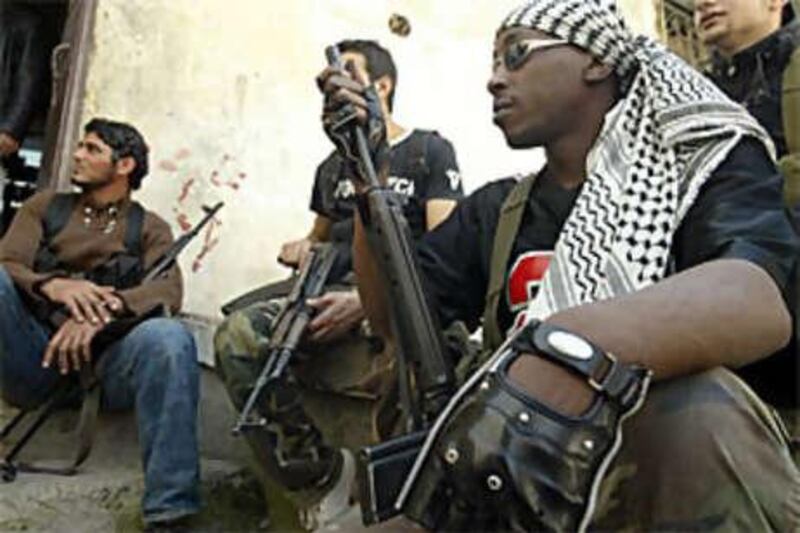BEIRUT // Militants wanted by Lebanese and Syrian authorities in connection with a series of bombings and assassinations have taken refuge in a corner of a crowded Palestinian refugee camp associated with radical groups, according to Lebanese and Palestinian security sources.
Two senior commanders of Fatah al Islam, a radical group inspired by al Qa'eda and closely linked to Iraqi insurgent groups, have begun fortifying a bunker complex in the southern corner of the Ain al Hilweh Camp outside the city of Sidon. Abu Mohammed Awad apparently replaced Shakir Abssi as commander of Fatah al Islam after Mr Abssi's disappearance in the wake of the siege of the Nahr al Bared camp in north Lebanon in the summer of 2007. Mr Awad's location was a mystery until last week, when Fatah security officials admitted he was inside Ain al Hilweh but not in their custody.
Abed al Hamid Issa, a Fatah commander also known as "Leno", said in an interview with The National there was no fighting in the camp yesterday but in an interview with al Hayat newspaper, he said that Mr Awad and his deputy, Usama al Shahabi, had begun to prepare an underground bunker complex near the Noor Mosque in the southern section of the camp in anticipation of an assault by either the Lebanese Army or Fatah fighters responsible for maintaining security in the camp.
According to a local journalist with close ties to the camp, who requested anonymity for security reasons, fighters for the mainstream Islamic group Esbat al Ansar have recently begun defecting from the Fatah-dominated Popular Committee, which unites various factions into a single security apparatus. Once closely aligned with Abu Musab al Zarqawi in Iraq, Esbat al Ansar joined the committee in an effort to reduce bloodshed between the Fatah authorities and their Islamic rivals, but multiple sources in the camp have said the group has joined its Islamic allies. Esbat al Ansar officials could not be reached for conformation, but if true, the defection of the group would be a major blow to the camp's stability because it can muster hundreds of experienced and armed fighters.
By tradition, Lebanese police and army troops do not enter the 13 Palestinian camps scattered around the country, but co-ordinate with forces loyal to the Palestinian Authority, Fatah and the Palestine Liberation Organisation. However, with more than 20 militant groups operating in a camp less than two square kilometres with a population of more than 50,000 people, Ain el Hilweh is considered one of the most lawless and unstable places in Lebanon. There is broad consensus among analysts that any move on the camp by the Lebanese army would be ill advised and bloody due to the number of armed militants taking refuge inside.
Mr Awad is sought in connection with two bombings this year in the northern city of Tripoli as well as the assassination of Pierre Gemayal, a prominent Christian politician, and a September car bombing in Damascus that killed 17 people. Syria claims Fatah al Islam conducted the Damascus bombing with the support of anti-Syrian political parties tied to Lebanon's Sunni Muslim population, while the Lebanese government accuses Syria of supporting the group and sending fighters to Lebanon from Iraq in late 2006.
The two commanders are thought to be protected by scores of fighters who once belonged to the now-defunct Jund al Sham radical group, whose remnants have been fighting a small-scale war against Fatah security forces led by Leno. About a dozen camp residents have perished in a series of tit-for-tat killings and bombings targeted at both Islamic radicals in the camp and fighters loyal to Fatah. Tensions between Fatah and the Islamic groups have been growing in the wake of Leno's campaign to weaken the remaining fighters from Jund al Sham, while a series of arrests this weekend further exacerbated the crisis, according to officials inside the camp.
On Sunday, Fatah security forces captured Mohammed al Dokhi, who is accused of serving as a liaison between various cells of the loosely knit radical groups, and turned him over to the Lebanese authorities. Two other suspected Fatah al Islam members were also arrested over the weekend by the Lebanese Army near the Beddawi refugee camp in northern Lebanon. mprothero@thenational.ae





